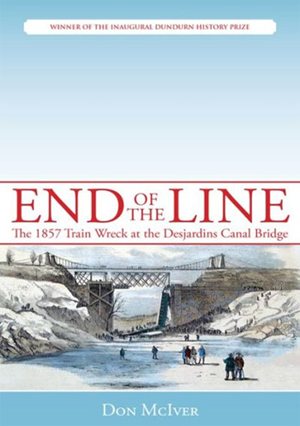End of the Line: The 1857 Train Wreck at the Desjardins Canal Bridge

Support Canada's History in other ways (more)
by Don McIver
Dundurn Press, Toronto, 2013
209 pp., illus., $26.99 paperback
As the saying goes, hindsight is 20/20. Looking back, we can also see that one of the worst railway wrecks in North American history involves its share of irony. In End of the Line: The 1857 Train Wreckat the Desjardins Canal Bridge, retired economist Don McIver examines the collapse of the bridge in Hamilton, Ontario. McIver focuses on two ironies of the disaster that killed sixty people in 1857 — first, that Samuel Zimmerman, the general contractor for that section of the Great Western Railway, died in the accident and is believed to have skimped on its construction, and second, the fact that the bridge’s designer was one of the most respected bridge engineers of the day.
With accounts from survivors, quotes from newspapers, and images of the disaster and of those involved, McIver takes readers to the minutes before a wheel axle broke on the Toronto-to-Hamilton train, causing it to derail with such force that the bridge collapsed and the train cars fell into the frozen canal below. One of McIver’s favourite stories is about a man who got off one stop early for a breath of fresh air or a quick drink at a local tavern. He lost track of the time and missed the train. Minutes later, it crashed.
McIver also studies the social, political, and economic environment before the Great Western Railway was built and concludes with a look at the inquest into the disaster, showing how the tragedy resulted from a confluence of events and decisions.
— Danelle Cloutier (Read bio)
Danelle Cloutier is a Red River College student in Winnipeg and recently completed an internship at Canada's History magazine.